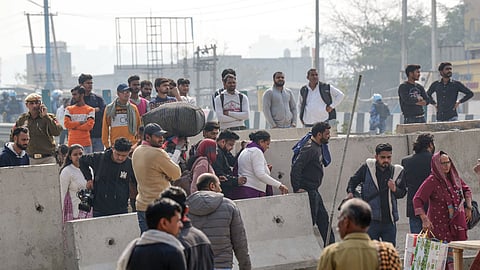Farmers protest: Traders, shopkeepers at Singhu border brace for tough times
NEW DELHI: More than two years after a massive agitation by farmers resulted in heavy losses for them, traders and shopkeepers at Delhi's Singhu border are again looking at tough times with a fresh round of protests threatening their businesses.
This time, it is the 'Delhi Chalo' march which began on Tuesday with thousands of farmers moving in trucks, tractor-trolleys, and on foot.
Though the march is currently contained at the Punjab-Haryana border, the fortifications of multiple layers of barricades and concrete blocks at Singhu, along with a huge deployment of police personnel, to stop them from entering the city, have also restricted the cross-border movement of people.
With various restrictions in place, including for traffic, even locals are having a hard time commuting and shops are closing as early as 2 pm.
"Our staff cannot reach work. We have been closed for the past two days, resulting in a loss of Rs 40,000 to Rs 50,000 a day," said Nikesh, the manager of the shopping complex 'Cost to Cost'.
The rent of the building "we operate in, comes to around Rs 20,000 a day," he claimed and asked, "Who will compensate for our losses? The government or the farmers?"
Only a handful of smaller shops are operating in the local market, but these too are facing losses due to fewer customers and early closures.
"My shops are running at a 95 percent loss since the restrictions. Our customers are from Singhu as well as areas in Haryana," said Karan, who has three shops in the area, one of which is a garment store.
"When the farmers' protest happened last time, we had to shut down three shops completely for a year. There are no customers here. Don't know what will happen this time," he said.
The 2020 agitation of farmers against the now-repealed three farm laws had stretched to over a year, and they camped at the Singhu, Tikri, and Ghazipur borders. Protesters had also entered Delhi, leading to clashes with police. Some also entered the Red Fort and climbed its ramparts.
Kapil, owner of a wholesale and retail shop at the Singhu border, said, "We asked our executives not to come to work on Wednesday and Thursday. There are seven helpers here. We are facing losses and shutting shop by afternoon."
"My store was shut down during the previous protest too. There was also the COVID-19-induced lockdown. Now, we have this protest," he said.
Recalling the days of the 2020 agitation, Nikesh said shops, including his shopping complex, were shut even then, but farmers had them opened. "But now, we are unsure of what is going to happen," he said.
Farmers have taken out the 'Delhi Chalo' march to press the Centre for a legal guarantee for minimum support price (MSP), implementation of the Swaminathan Commission's recommendations, pensions for farmers and farm labourers, farm debt waiver, withdrawal of police cases and "justice" for victims of the Lakhimpur Kheri violence, reinstatement of the Land Acquisition Act 2013, withdrawal from the World Trade Organisation, and compensation for the families of the farmers who died during the previous agitation, among others.

